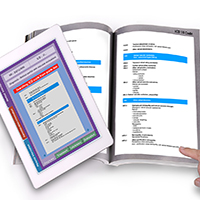
Certification for health information management
Registered Health Information Technician (RHIT®): Healthcare professionals who work in health information management (HIM) often hold the RHIT certification. An RHIT’s role includes ensuring the quality of medical records and the analysis of data. These technicians work in hospitals and other healthcare facilities as well as in pharmaceutical and health insurance companies.
- Click on the Forward arrow to continue.

Certification for medical coding
Certified Coding Associate (CCA™): This is the first-level certification in the medical coding profession. The next level is the Certified Coding Specialist (CCS). This can be achieved by having the CCA and 1 year of experience. Additional certifications can be achieved by working in the coding field, earning a higher-level educational degree, or through work experience in a specific area.
- Click on the Forward arrow to continue.

Certified Medical Administrative Assistant (CMAA)
Certified Medical Administrative Assistant (CMAA): One important role in all healthcare institutions is the work performed in the front office setting. The students in an associate’s degree healthcare program should be aware of the certifications and future opportunities to demonstrate their knowledge, abilities, and skill sets. This is a starting point to a continuing career in the healthcare field. It starts with an education in a formal program of study. Degrees are referred to as a diploma or an associate’s degree. A degree such as an associate of science in health services administration provides a foundation to build upon with the experience already gained by employment in the healthcare field or to begin a career in healthcare.
One example of a certification available is the Certified Medical Administrative Assistant (CMAA), which is different from a certified medical assistant (CMA) and demonstrates an individual’s knowledge and abilities in the areas of front office procedures, such as the following:
- Proper documentation of patient information
- Maintaining the confidentiality and privacy of a patient’s protected health information (PHI)
- Understanding insurance and billing procedures
- Proper understanding and use of medical terminology
- Technical ability to use computer programs, databases, and office equipment
The alternative eligibility to take the certification examinations for these professions is often 1 year of supervised work in the field related to the certification.
- Click on the Forward arrow to continue.